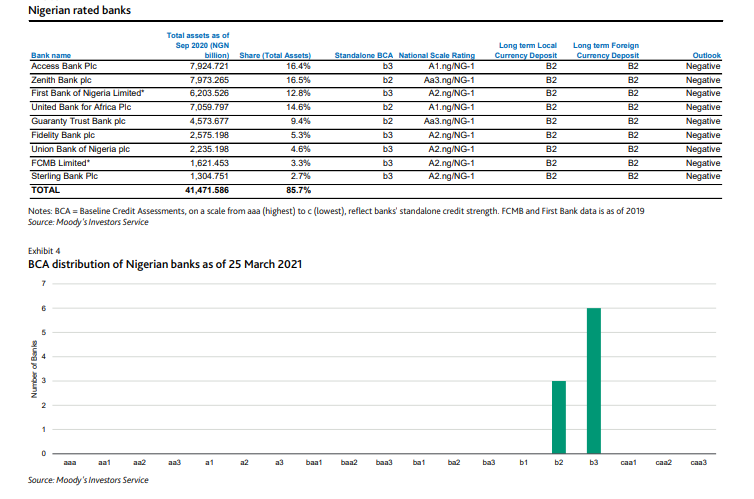Moody's - Outlook on Nigeria's banking system remains negative as asset risk will increase

Report’s highlights:
- Problem loans are expected to rise to 8%-10% of total loans, from 6% in 2020, as support measures put in place last year to sustain financial stability are withdrawn
- Profitability will weaken as revenue growth falls and loan losses rise
- However, local currency funding and liquidity will remain robust, and foreign-currency shortages will ease
London, March 30, 2021 --
- Nigeria's banking outlook remains negative
- Asset risk will increase and government support capacity is weakening
The outlook for Nigeria's banking system remains negative, reflecting expectations of rising asset risk and weakening government support capacity over the next 12 to 18 months, Moody's Investors Service said in a report published today.
"Nigerian banks' loan quality will weaken in 2021 as coronavirus support measures implemented by the government and central bank last year, including the loan repayment holiday, are unwound," says Peter Mushangwe, Analyst at Moody's and the co-author of the report. "The negative outlook also captures the weakening capacity of the Government of Nigeria to support the country's banks in case of need, as reflected by the negative outlook on the government's credit rating; on the other hand, Nigerian banks hold robust capital buffers and foreign-currency shortages will ease."
Banks in Africa's biggest economy face higher asset quality risks as coronavirus support measures are withdrawn amid large single-name and sectoral concentrations and as banks hold a large volume of foreign currency loans. Banks balance sheets are also burdened by large volumes of Stage 2 loans. We estimate that between 40% to 45% of banking loans were restructured in 2020, easing pressure on borrowers following the outbreak of the pandemic.
Still, the government's capacity to support banks may weaken, as it has an extremely low revenue base, which has remained below 10% of GDP since 2015. However, the government's willingness to provide support to large banks in the event of a crisis and to sustain financial stability will remain high.
Moody's expects economic activity to rebound in Nigeria, with real GDP growth of 2.1% this year and 3.1% in 2022, following a 1.9% contraction in 2020. The current high oil prices, if sustained, will further boost economic activity; however, the economy will remain sensitive to oil price movements.

